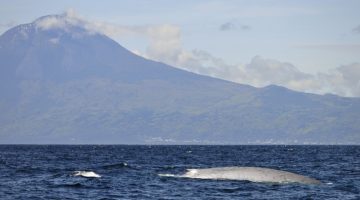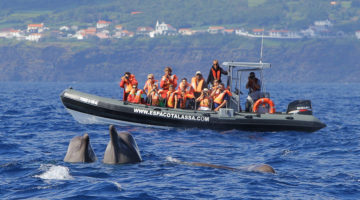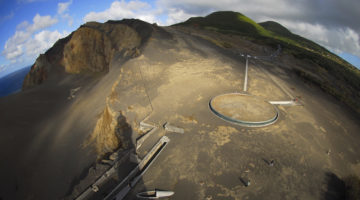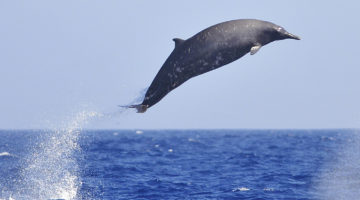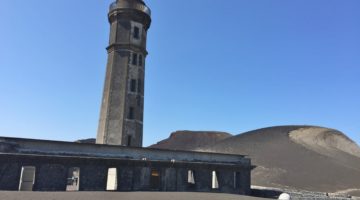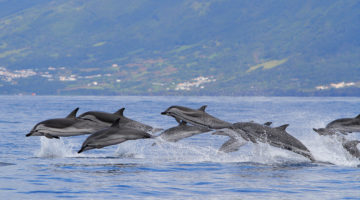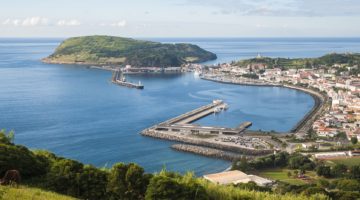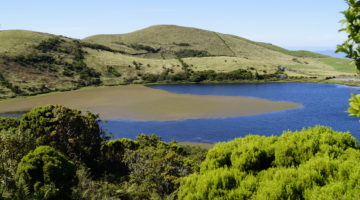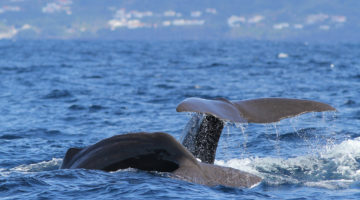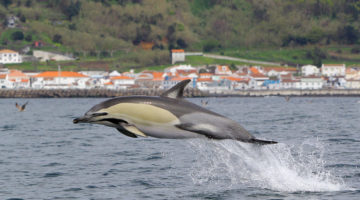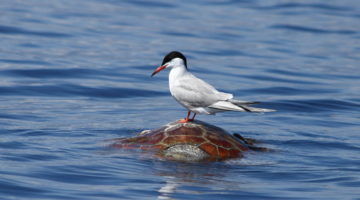Azores, land of whales
Although the islands are close to each other, they are very different. Take the time to discover the soft slopes of Faial and the dramatic scenery of Pico. You may also wish to observe the fauna and flora of the island of Sao Jorge, which can be reached by a quick boat ride from Pico.
An 8-day package that includes:
- Pick up and drop off at Horta airport.
- Transfer from Horta to Lajes do Pico (day 4).
- 3 nights 2* accommodation & breakfast in Horta.
- 4 nights 2* accommodation & breakfast in Lajes do Pico.
- Two 3-hour whale-watching excursions in Horta run by “Azores Experience”
- Two 3-hour whale-watching excursions in Lajes do Pico run by “Espaço Talassa”
- Insurance, government taxes, and a cetaceans observation permit included.
- Free entrance to the Whaler’s museum in Lajes do Pico.
The package does not include:
- Travel, meals.
- Optional activities.
- Any other service not outlined in the package description.
Prices are per person based on double room occupancy
- Single room supplement: 119 Euros
- Single passenger supplement: 154 Euros
- Supplement for reserving a sea-view room: 28 euros per person on Pico Island
In Horta, a new quote will be provided upon request if sea-view rooms are no longer available at the chosen accommodation.
Day 1: Pick up from Horta airport and transfer to your accommodation. The taxi transfer will take you to the Hortacetaceos base and show you how to make your own way there the next day.
Day 2: Rendezvous with Pedro at 9am for the first boat trip. The afternoon is free, giving you an opportunity to explore the small town of Horta and admire the numerous drawings left by travelling sailors (famous or not!) at the marina.
Day 3: Second boat trip. Afterwards you’ll appreciate a nice swim at “Porto Pim”. This fantastic bay, cemetery to thousands of sperm whales, today hosts a magnificent black-sand beach. Scrimshaws, sculpted from the whales’ teeth, can be seen at the inevitable “Café Sport”.
Day 4: In the morning you can visit the main attractions of Faial (see “Optional Activities”). In the afternoon we will pick you up from your accommodation and take you to the ferry terminal where a 30-minute boat ride will transport you to Madelena. We will be waiting there to transfer you to Espaço Talassa in Lajes do Pico.
Day 5: Third boat trip trailing the dolphins and whales of the south of Pico. In the afternoon a stroll to the “Vigia de Queimada” (the look-out) will give you a better understanding of how we situate the animals and how Marcel leads us to them. Magic!
Day 6: Fourth and last boat trip, after which, you can delve in to the history and culture of whaling in the Azores at the museum in Lajes (a few metres from our base) and at SIBIL, the old sperm-whale conditioning factory, now converted in to an arts of the sea centre.
Day 7: Hikers can tackle Mount Pico while bio-diversity enthusiasts can head for Sao Jorge Island. See “Optional Activities”.
Day 8: Alas…direction Madelena and then Horta airport, after crossing the famous Vitorinio Nemésio channel that separates the two islands.
Day 4: A 4-hour discovery tour of Faial that takes you to Caldeira (the highest point on the island), to the Capelinhos volcano, and to the Espalamaca headland. Push it to 7 hours and you can also visit the “Capelinho Information centre” and enjoy a leisurely bite to eat by the sea (entry fee and lunch included in the price). To the extent that we always privilege small groups, it is possible to adapt these trips according to individual preferences.
Day 7: Climb Portugal’s highest mountain, the Pico volcano, learn more here or spend the day learning about the treasures of the Azorean sea, over and above whales and dolphins, more info here.
 By choosing Espaço Talassa, you choose to limit your ecological footprint.
By choosing Espaço Talassa, you choose to limit your ecological footprint.
- Espaço Talassa plants trees and contributes to a “micro-reserve” project as compensation for the ecological deficit and the CO2 emissions related to our whale watching activity, in collaboration with association “Quercus”.
- For each customer €0,50 cents will be donated towards the “Cabeço Santo” (GPS position: 40º31’52″N 8º20’36″W- Google Maps) reforestation project in the mountain range of Caramulo, victim of a terrible forest fire in 2005. Soon the indigenous vegetation will substitute eucalyptus, acacias and other infesters.
It’s true: “the sea is blue because forests are green”!
30 years of experience in the Azorean sea
Our team is highly disciplinary and ethnically rich, being composed of a majority of natives but also Dutch, German, English, French, Brazilian and Spanish…
Undoubtedly one of the 10 best whale watching spots in the world
The Azores, and especially Lajes do Pico, is undoubtedly one of the 10 best whale watching spots in the world, and for sure the best in the Azores. Tourist frequentation is still small, the quantity and diversity of the whales observed is high, there’s little visual pollution and Pico mountain lies in the background.
Small boats which limit the impact on the animals
Driven by 4 stroke engines: less noise and chemical pollution… “Size matters”!
Small groups, maximum 12 people per boat
It is evidently more human!
Multimedia Briefing
Before each whale watching trip, we give an approximate 30 minute presentation on biology and animal behaviour, the history of whale hunting, ecology, legislation…
Debriefing
After each trip, have a drink and debrief with our specialists on the species observed, your doubts or questions…
Queimada look-out post, an Espaço Talassa exclusive,
A minimum of 2 look-outs direct a maximum of 3 boats. The look-outs locate the animals, and guide the whale watching boats to minimise the negative impact on the animals: manage the number of boats around the same group, manage boat speed and angles of incidence. There is therefore a strong complicity and trust between them and the skippers.
Boats equipped with hydrophones
Not only to help locate the animals, but especially to add acoustics to the visual experience
Responsible travel
By choosing to experience whale watching with Espaço Talassa, you are choosing to limit your ecological footprint. Espaço Talassa plants trees and contributes to a “micro-reserve” project as compensation for the ecological deficit and the CO2 emissions related to our whale watching activity. For each customer, approximately €0,50 cents are donated to the Project
Fair trade tourism
Espaço Talassa believes that encountering the cetaceans is educational and should be accessible for the locals: whalers’ children, youngsters, students, the less privileged… “Solidaridade“is a project which allows the inhabitants of Pico, students of any age, youth card holders, and the unemployed to encounter the whales and dolphins which cross south of Lajes do Pico by paying a symbolic sum of 30€.
Let’s lay our cards on the table:
- Our whale watching boats are fast and intended for active trips. Unfortunately, we cannot accommodate people with reduced mobility, pregnant women, or anyone with osteoporosis, sciatica, …
- Comfort on board is basic therefore it’s worth taking some precautions before embarking. The gentlemen’s WC’s are on starboard and the ladies on portside… with breath-taking views of the Atlantic!
- We put you directly in contact with nature which can also mean rain (sometimes pretty heavy) and the sun…
- As we believe that swimming with dolphins could be a risky activity for you and overall very intrusive for the animals, we stopped the activity in 2017. To learn more: Why you shouldn’t swim with dolphins
Where are the Azores?
Trace a straight line from Lisbon to New York, and in the middle of the Atlantic, you’ll find the archipelago of the Azores. The archipelago is divided into 3 groups, and in the central group, on the southern coast of Pico island, you’ll find Lajes…
- This is where Europe ends: 38 degrees North and 30 degrees West, some 800 nautical miles from the nearest coast, in the middle of the Atlantic Ocean. The Azoreans, isolated for centuries, have survived on their resources of agriculture, fishing and…. whale hunting. Melville drew inspiration from such odysseys to write his epic tale, “Moby Dick”.
- For the last 30 years, it has been strictly prohibited to harm cetaceans in the Azores.
- The sperm whale prefers the south coast of Pico. Here, assisted by Marcel, the Queimada’s lookout, you can observe the whales and get close to them. The ambition of the project goes even further as it includes an introduction into other traces and vestiges of the whaling culture and tradition, of which the people of Lajes are the last witnesses.
- Last but not least these wildlife observation holidays, which respect both the animals and the local culture, are the natural way for Azoreans to continue to remain involved with whales long after the end of whale hunting in 1984. Whale watching offers an alternative way with whales for the Lajes community, and at the same time is an ideal way to protect the giants of the sea.
- To have a Wiki-idea about the Azores, please click here
Thanks to our look-out techniques from land, we don’t leave the harbour blindly. Each morning before embarking, a briefing is held during which we take into consideration the observations made by the lookout. The type of cetacean spotted, their groups, their distance from the harbour, the sea conditions, the number of animals in the group, and the absence or presence of smaller whales are all necessary factors in assessing the quality of forthcoming excursions.
28 cetacean species frequent the Azores sea
In the interface of the North Atlantic, between “hot water” and “cold water”, the archipelago is without any doubt one of the best places for cetacean observation in the northern hemisphere. Also, because the islands are far away from the main merchant navy routes, recreational sailing has not yet made the carnage known in Continental Europe, and the large pollution emitters are relatively far off.
Tarifs
| Low Season from 03-22 to 04-11 and from 10-04 to 11-07 |
Medium Season from 05-03 to 06-27 and from 08-30 to 03-10 |
High Season from 04-12 to 05-02 and from 06-28 to 08-29 |
|
|---|---|---|---|
| 8 days & 2 islands package | €530 | €590 | €730 |
| Option 4 hours tour on Faial Island(D4) | €53 | €53 | €53 |
| Option 7 hours tour on Faial Island(D4) | €99 | €99 | €99 |
| Option Pico mountain climb (with transfer from the hotel)(D7) | €69 | €69 | €69 |
| Option full "Sea watch" day | €118 | €128 | €148 |
